The skin on your lips is much thinner and more delicate than the skin on the rest of your body. This is why lips are more susceptible to drying out and becoming chapped. In fact, the lips are one of the first places on the body to show signs of dehydration.
One of the main reasons for this susceptibility is the lack of sebaceous glands on the lips. Sebaceous glands produce oil that helps to keep the skin moisturized and protected. Since the lips don't have these glands, they are not able to produce their own moisture, making them more vulnerable to drying out.
Another reason why lips are more susceptible to drying out is because they are constantly exposed to the elements. The lips are always exposed to the air, whether you are outside or inside, and this can cause them to lose moisture quickly. In addition, the lips are also exposed to wind, sun, and cold weather, all of which can contribute to drying out and chapping. In this article we will discuss easy lip care tips to keep your lips soft and supple.
5 Simple Steps to Avoid Dry, Chapped Lips
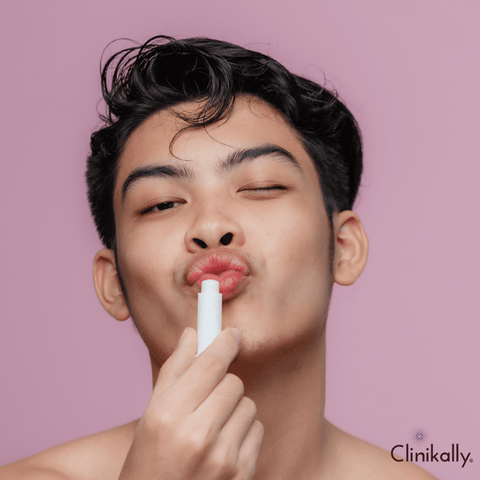
To keep your lips healthy and hydrated, it's important to take care of them and protect them from the elements. If you have dry sensitive lips, its always best to see a dermatologist who can provide personalized treatment plan and recommend the best lip care products which is ideal for you lips. At Clinikally, we provide online dermatologist consultation that lets you book appointment with doctor at your chosen time slot and convenience. Here are a few tips to help you prevent dry, chapped lips:
-
Drink plenty of water: Dehydration is one of the main causes of dry, chapped lips. To prevent this, make sure you are getting enough water throughout the day. Aim for at least 8-10 cups of water per day.
-
Use lip balm: Lip balm is a great way to keep your lips moisturized and protected. Look for a balm that contains natural ingredients, such as shea butter or beeswax, which will help to soothe and moisturize the lips.
-
Avoid licking your lips: Licking your lips might feel good in the moment, but it can actually make them drier in the long run. When you lick your lips, you are removing the natural oils that help to keep them moisturized. Instead, use a lip balm to keep your lips hydrated.
-
Use lip balm with SPF: The sun can be damaging to your lips, just as it is to the rest of your skin. To protect your lips from the sun's harmful UV rays, look for a lip balm that contains SPF. This will help to prevent sunburn and keep your lips healthy and hydrated.
-
Avoid drying ingredients: Some ingredients, such as alcohol and menthol, can be drying to the lips. Avoid using products that contain these ingredients, as they can exacerbate dryness and chapping.
By following these tips, you can help to prevent dry, chapped lips and keep your lips healthy and hydrated. Don't let dry, chapped lips ruin your day – take care of them and enjoy soft, smooth lips all year round.
Identifying the causes of dry lips
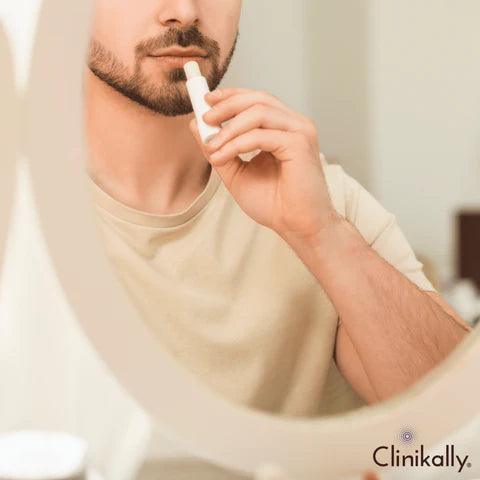
Dry lips, also known as chapped lips, can be caused by a variety of factors, and understanding the underlying causes can help you treat and prevent the problem. The following are some of the most common causes of dry lips:
-
Lack of Moisture: Lip dehydration can occur when there is insufficient moisture in the air, particularly in dry or cold climates. Use a humidifier to add moisture to the air in your home. Drink plenty of water to stay hydrated.
-
Licking Lips: Excessive licking of the lips can remove natural oils, causing dryness. Lip licking should be avoided because saliva evaporates quickly, leaving the lips even drier. Instead, apply a hydrating lip balm to your lips.
-
Sun Exposure: Prolonged sun exposure can cause sunburn on the lips, resulting in dryness. Use a broad-brimmed hat, apply SPF-containing lip balm, and stay out of the sun for as long as possible.
-
Wind Exposure: Dry lips can be caused by wind removing moisture from the lips. To protect your lips from the wind, wrap a scarf around yourself or use a protective lip balm.
-
Extreme Weather Conditions: Cold, dry weather can aggravate lip dryness and chapping. In cold weather, apply a moisturising lip balm and cover your lips.
-
Dehydration: In general, dehydration can affect the moisture levels in the body, including the lips. Drink plenty of water throughout the day to stay hydrated.
-
Breathing with the Mouth: Breathing through the mouth, especially while sleeping, can contribute to dry lips. Stay hydrated, and think about using a humidifier in your bedroom.
-
Allergic Reactions: Allergies to specific lip care products, toothpaste, or foods can cause irritation and dryness. Allergens should be identified and avoided. Lip care products that are hypoallergenic should be used.
-
Medications: Some medications may cause dry lips as a side effect. If you suspect that a medication is causing dry lips, talk to your doctor about possible alternatives or solutions.
-
Nutrient Deficiency: A lack of essential nutrients such as vitamins B and C can contribute to dry, chapped lips. Maintain a healthy diet that is high in fruits, vegetables, and whole grains.
-
Smoking: Smoking can irritate and dry out the lips. Quitting smoking can improve the overall health of your skin and lips.
-
Overuse of Matte Lipsticks: Some lipsticks, particularly matte formulations, can be drying. Choose hydrating lip products and avoid wearing heavy lipsticks.
-
Harsh Lip Scrubs: Excessive or harsh lip scrubs can strip away natural oils. Apply gentle lip exfoliants sparingly, and then apply a moisturising lip balm.
If you have persistent or severe dry lips despite home remedies, you should see a doctor because there could be an underlying medical condition that needs to be addressed.
Natural ingredients for lip hydration
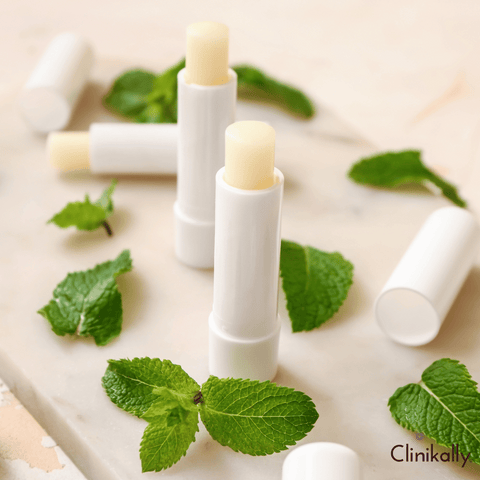
Many natural ingredients have moisturising properties that can help hydrate and nourish the lips. Here are some natural ingredients that are commonly found in lip care products for effective hydration:
-
Beeswax: Beeswax forms a protective barrier that keeps moisture in and prevents dehydration. It also gives lip balms a creamy texture. Look for lip balms that include beeswax as a main ingredient.
-
Shea Butter: Rich in fatty acids and vitamins, shea butter provides deep hydration and promotes soft, supple lips. Use lip balms or lip products containing shea butter for intense moisturization.
-
Coconut Oil: Coconut oil is a natural emollient that aids in the moisturization and softening of the lips. It is also high in antioxidants. Use a tiny amount of pure coconut oil or lip balms containing coconut oil.
-
Jojoba Oil: Jojoba oil closely resembles the skin's natural oils, providing long-lasting hydration without leaving a greasy residue. To nourish your lips, look for lip balms or treatments that contain jojoba oil.
-
Almond Oil: Almond oil contains vitamin E and can be used to soothe and moisturise dry, chapped lips. Apply almond oil directly to the lips or select lip products containing almond oil.
-
Cocoa Butter: Cocoa butter is a thick, rich emollient that moisturises thoroughly and helps to enhance skin flexibility. For a moisturising effect, look for lip balms or lip butters that contain cocoa butter.
-
Honey: Honey is a natural humectant, meaning it attracts and retains moisture. It also contains antioxidants, which help to maintain healthy skin. Apply a tiny amount of pure honey to your lips or use honey-infused lip creams.
-
Aloe Vera Gel: Aloe vera has soothing and moisturising characteristics, making it useful for dry or sore lips. On the lips, apply pure aloe vera gel or aloe vera-infused lip balms.
-
Olive Oil: Olive oil is a nutritious oil high in antioxidants and good fats that moisturises the lips. Apply a small amount of extra virgin olive oil to the lips or use olive oil-based lip products.
-
Vitamin E: Vitamin E is an antioxidant that promotes healthy-looking lips by protecting and moisturising the skin. Apply vitamin E oil directly to the lips or choose vitamin E-enriched lip creams.
-
Rosehip Oil: Rosehip oil is high in important fatty acids and vitamins, which help to moisturise and repair the lips' delicate skin. For extra hydration, look for lip creams that contain rosehip oil.
-
Avocado Oil: Avocado oil is high in vitamins and fatty acids, and it moisturises and nourishes dry lips. Choose avocado oil-containing lip products or apply the oil directly to the lips.
When shopping for lip care products, look for these natural moisturising substances on the ingredient list. Furthermore, staying hydrated by consuming enough water benefits general lip health.
3-step lip care routine for soft supple lips
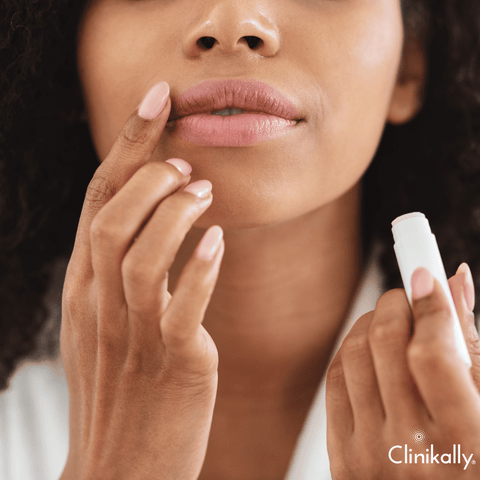
Just like your skin, your lips too require a routine to keep them healthy and fresh. If you don't wish to get into an elaborate plan, you can follow a simple 3-step lip care routine that includes:
-
Exfoliate: First and most importantly, use a lip exfoliator or make a DIY lip scrub and give your lips a nice rinse. Let this lip care routine step help you get rid of dead skin cells and other impurities off your lips. Remember to not be too harsh with your exfoliation as it can go horribly wrong if you over-exfoliate the sensitive skin on your lips.
-
Moisturise: Once you're done with exfoliation, treat your lips to moisturizing therapy. For this, you can use a super moisturizing lip mask. Here's a recipe for a DIY lip mask - Mix five to six drops of coconut oil with 2-3 drops of any essential oil that you like. Apply this lip mask all over your lips and let it sit for 20 minutes before you gently wipe off the extra bits.
-
Hydrate: The last step of this lip care routine is to use a lip balm that soothes your skin and locks in moisture. Make sure you invest in a hydrating lip balm that you can use daily to get soft and hydrated lips. While you're at it, make sure to drink enough water throughout the day to keep your body hydrated from the inside.
To make your lips pink in five minutes, you can rub a slice of cucumber on your lips every single day for five minutes. You can also mix equal amounts of almond oil and coconut oil and apply them all over your lips before bedtime. This will hydrate your lips and give them a rosy sheen too.
You can brush your lips with a toothbrush to get rid of dry skin and make them softer and smoother. Make sure you're very gentle with the brushing as over-exfoliation can irritate the delicate skin on your lips. It's better to limit brushing your lips to just once a week otherwise it could lead to irritation.
The colour of lips can differ from person to person. The range lies between very light pink to brown. This is because your lips are made up of three to five cellular layers unlike the rest of your skin which is made of multiple layers.
The importance of exfoliation in lip care
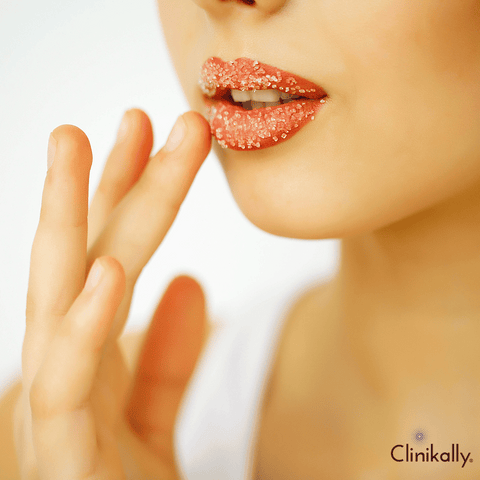
Exfoliation is important in lip care because it removes dead skin cells, increases cell turnover, and improves the general health and appearance of the lips. Exfoliation is beneficial in lip care for various reasons, including:
-
Removes Dead Skin Cells: Dead skin cells can build on the lips over time, causing dryness, flakiness, and a dull appearance. Exfoliating the lips gently removes dead skin cells, revealing smoother and softer skin.
-
Improves Lip Texture: Regular exfoliation helps improve the texture of the lips, making them feel smoother and more supple. The removal of rough and uneven skin improves the overall feel of the lips.
-
Enhances Lip Color: Exfoliation can increase blood flow to the lips, giving them a natural rosy tint. By promoting circulation, exfoliation contributes to healthier-looking, more vibrant lips.
-
Prevents Lip Dryness and Chapping: Dry and chapped lips are commonly caused by an accumulation of dead skin cells and a lack of moisture. Exfoliation regularly helps to prevent and relieve dry skin by sloughing off dead skin and allowing moisturising products to enter more effectively.
-
Aids in Lip Product Absorption: Lip balms, oils, and other moisturising treatments absorb better on exfoliated lips. Exfoliation improves the absorption of lip care products by providing a smoother surface, maximising their effectiveness.
-
Prepares Lips for Makeup Application: Lips that are smooth and exfoliated create a better canvas for applying lipstick, lip gloss, or other lip makeup products. Exfoliated lips allow makeup to adhere more evenly and remain longer, resulting in a more polished image.
-
Reduces the Appearance of Fine Lines: Fine lines and wrinkles can be more visible on dry, uneven lips. Exfoliation regularly helps to reduce the appearance of fine wrinkles by creating smoother, more youthful-looking lips.
-
Addresses Discoloration: The collection of dead skin cells can produce discoloration or uneven pigmentation. Exfoliation, by removing the outer layer of skin, can help achieve a more equal skin tone on the lips.
-
Promotes Lip Health: Regular exfoliation is part of a full lip care routine, and healthy lips are crucial for general well-being. It promotes overall lip health by keeping the surface balanced and moisturised.
-
Encourages Collagen Production: Lip firmness and suppleness can be maintained by stimulating collagen synthesis. Exfoliation regularly may stimulate collagen formation, resulting in plumper, more youthful-looking lips.
While exfoliation is good, it is critical to exfoliate the lips gently due to their sensitive skin. Exfoliating the lips with a lip scrub or a soft toothbrush in circular motions, or applying a homemade sugar scrub, are both good methods. It's best to follow up with a moisturising lip balm to seal in the moisture. Individual needs determine exfoliation frequency; however, it is generally recommended to exfoliate the lips 1-3 times weekly.
Nourishing lip balms and treatments
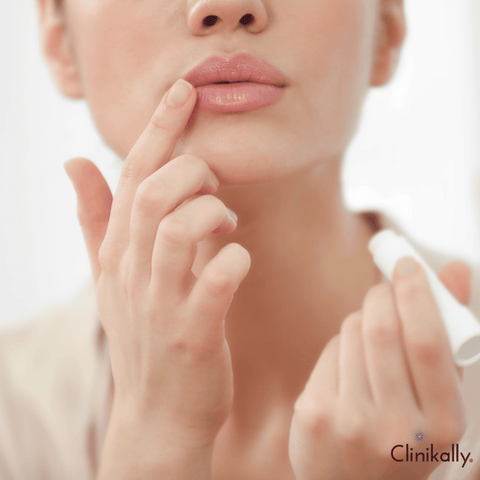
Choosing nourishing lip balms and treatments is essential for maintaining soft, hydrated, and healthy lips. Look for products that contain a combination of moisturising and nourishing ingredients to address dryness and protect your lips. Here are some ingredients commonly found in nourishing lip balms and treatments:
-
Shea Butter: Shea butter is high in fatty acids and vitamins, and it moisturises and nourishes the lips.
-
Jojoba Oil: Because jojoba oil closely resembles the natural oils produced by the skin, it is an excellent moisturiser for the lips that does not leave them feeling greasy.
-
Coconut Oil: Coconut oil is a natural emollient that softens and hydrates the lips. It is also high in antioxidants.
-
Beeswax: Beeswax forms a protective barrier on the lips, preventing dehydration and sealing in moisture.
-
Vitamin E: Vitamin E is an antioxidant that protects the lips from environmental damage and promotes overall lip health.
-
Hyaluronic Acid: Hyaluronic acid is a hydrating ingredient that attracts and retains moisture, keeping the lips plump and moisturised.
-
Cocoa Butter: Cocoa butter is a thick, rich emollient that deeply moisturises and improves the elasticity of the lips.
-
Almond Oil: Rich in vitamin E, almond oil can help soothe and nourish dry, chapped lips.
-
Aloe Vera: Aloe vera has soothing properties that can help soothe and hydrate irritated lips.
-
Olive Oil: Olive oil is a nourishing oil high in antioxidants and healthy fats that hydrates the lips.
-
Avocado Oil: Avocado oil is high in vitamins and fatty acids, and it provides intense hydration and nourishment to dry lips.
-
Sunflower Seed Oil: Sunflower seed oil is lightweight and nutrient-rich, making it an excellent choice for moisturising the lips without feeling greasy.
-
Rosehip Oil: Rosehip oil is known for its regenerative properties, which help to heal and nourish the delicate skin on the lips.
-
Lanolin: Lanolin is a natural moisturiser derived from sheep's wool that has excellent emollient properties and is ideal for preventing dryness.
-
Ceramides: Ceramides help to strengthen the skin's natural moisture barrier, promoting hydration and preventing moisture loss.
-
Glycerin: Glycerin is a humectant that attracts and retains moisture, which helps to keep the lips hydrated.
Consider your preferences when selecting a nourishing lip balm or treatment, such as texture, fragrance, and if you prefer a tinted or untinted product. Additionally, if you want extra sun protection, choose products with SPF. The use of a high-quality lip balm or treatment can help maintain the health and appearance of your lips
Bottom Line
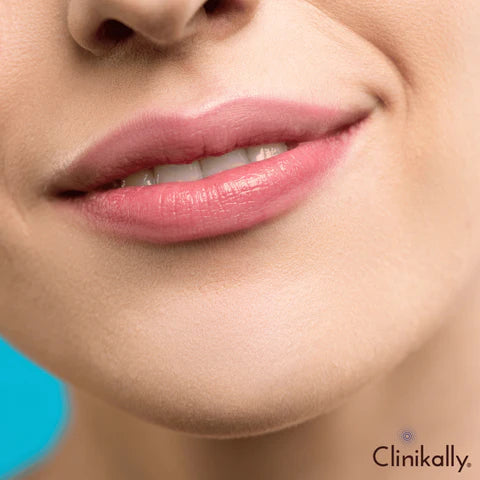
In conclusion, treat lip care as important as skincare and you will rarely see a crack on your lips. The key to having pouty puckers is to give them basic care. All your lips ask for is a little bit of hydration and a lot of love! Give them that and you'll never see dull lips ever again.
Preventative measures for year-round lip health
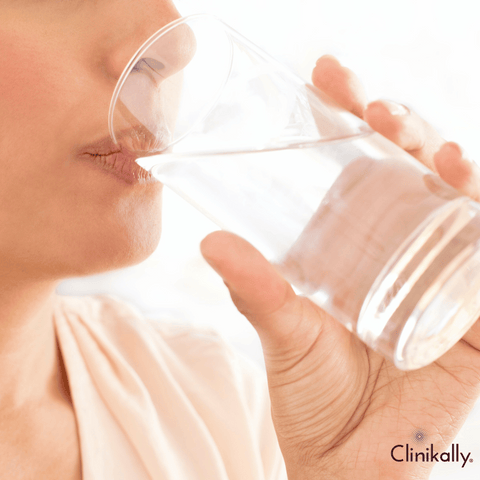
Maintaining lip health all year requires a combination of preventive actions and constant treatment. Here are some tips to keep your lips healthy all year long:
-
Stay Hydrated: Drink plenty of water to keep your body and lips moisturised. Dehydration can contribute to dry, chapped lips.
-
Protect from Sun Exposure: To protect your lips from the damaging effects of UV rays, use a lip balm containing SPF. Sunburn can occur on the lips, especially if they are exposed to the sun for an extended time.
-
Humidify Indoor Air: Use a humidifier in your house to add moisture to the air and avoid dryness, especially during the winter months.
-
Avoid Licking Your Lips: Resist the urge to lick your lips, since saliva can worsen dryness and chapping.
-
Choose Lip Products Wisely: Choose lip balms and treatments that contain nourishing components like shea butter, jojoba oil, and vitamin E. Avoid goods that may include irritants.
-
Exfoliate Regularly: Exfoliate your lips gently to eliminate dead skin cells. This improves the smoothness and effectiveness of lip care products.
-
Protect from Harsh Weather: Use a scarf or a coating of lip balm to protect your lips from harsh elements during extreme weather conditions, such as frigid winters or windy days.
-
Maintain a Healthy Diet: Consume a well-balanced diet high in vitamins, minerals, and omega-3 fatty acids to improve general skin and lip health.
-
Avoid Caffeine and Alcohol: Caffeine and alcohol can aggravate dehydration. Consume them in moderation, and make sure you drink enough water to compensate.
-
Use a Silk or Satin Pillowcase: Using a silk or satin pillowcase while sleeping lowers friction on your lips, minimising discomfort and dryness.
-
Practice Lip-Friendly Habits: Avoid picking or biting your lips, since this can cause damage and chapping. When applying lip cosmetics, be gentle.
-
Regularly Trim and Moisturize: Apply lip balm throughout the day to keep your lips moisturised. Gently exfoliate any dry or chapped skin regularly.
-
Stay Informed About Allergens: Consider potential allergens in lip care products, such as perfumes or specific substances, and select products that are appropriate for your skin.
-
Stay Consistent with Lip Care: Create a lip care routine that includes frequent moisturising, light exfoliation, and sun protection.
-
Consult a Dermatologist if Needed: If you have persistent lip problems such as chronic dryness, cracking, or irritation, see a dermatologist for personalised advice and treatment.
You may support year-round lip health and experience soft, smooth, and well-hydrated lips regardless of the season by including these preventative actions in your regimen.
When to seek professional care for lip issues
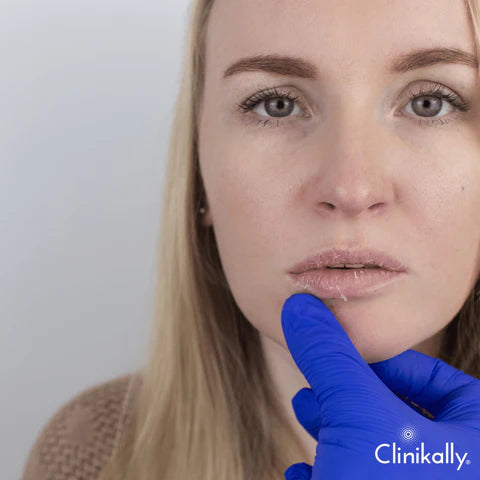
While many common lip issues can be properly treated at home, there are some cases when expert care from a dermatologist or healthcare specialist is recommended. Here are several circumstances in which you should seek expert assistance for lip problems:
-
Persistent Dryness and Chapping: If your lips remain dry, chapped, or sensitive after regular at-home care and moisturising, it could be a sign of an underlying problem that necessitates professional treatment.
-
Severe or Recurrent Cracking: Severe or recurring lip cracking, especially if it results in bleeding or open sores, may signal a more serious problem that necessitates medical attention.
-
Frequent Cold Sores or Lesions: If you have frequent or severe cold sores, ulcers, or lesions on your lips, it's best to see a doctor for correct diagnosis and treatment.
-
Sudden Onset of Swelling or Allergic Reactions: Seek emergency medical assistance if your lips swell, turn red, or you have an allergic response to a lip product, especially if you have problems breathing.
-
Persistent Redness or Discoloration: Lip redness, discolouration, or changes in pigmentation may indicate an underlying issue that necessitates professional evaluation.
-
Painful Blisters or Lesions: Blisters, lesions, or sores on the lips that are painful could indicate a variety of illnesses, including infections or oral herpes. Seeking expert help is critical for accurate diagnosis and treatment.
-
Unexplained Itching or Burning Sensations: If you have unexplained itching, burning, or discomfort on your lips that does not improve with over-the-counter medications, you should consult a healthcare expert.
-
Persistent Swelling or Lumps: Swelling, lumps, or bumps on the lips that persist may necessitate a professional examination to rule out any growths or tumours.
-
History of Skin Conditions: If you have a history of skin diseases like psoriasis, eczema, or dermatitis and discover signs on your lips, seek expert help for proper diagnosis and therapy.
-
Changes in Texture or Thickness: If you observe inexplicable and persistent changes in the texture or thickness of your lips, you should see a dermatologist for a comprehensive evaluation.
-
Lip Cancer Concerns: Lip cancer, while uncommon, can occur. Consult a healthcare practitioner if you have any concerns about strange growths, chronic sores, or changes in the appearance of your lips.
Remember that early detection and action are critical in effectively managing various lip problems. If you have any doubts about a lip problem or if it persists despite your efforts, it is always a good idea to seek expert help for a proper diagnosis and treatment plan.

















1 comment
Ayuvya
Treat your lips to pure bliss with Ayuvya Lipishk Lip Butter. Formulated with 100% Ayurvedic ingredients, this decadent lip butter pampers your lips with intense hydration and nourishment. Say goodbye to dry, chapped lips and hello to a state of blissful softness and comfort.
Treat your lips to pure bliss with Ayuvya Lipishk Lip Butter. Formulated with 100% Ayurvedic ingredients, this decadent lip butter pampers your lips with intense hydration and nourishment. Say goodbye to dry, chapped lips and hello to a state of blissful softness and comfort.